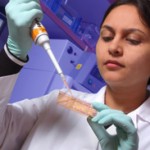Non-alcoholic fatty liver disease (NAFLD) is one of the most common liver conditions in the United States, affecting 30 percent of the population, and increasing — and likely to catch up in prevalence with obesity and diabetes. In NAFLD, fat content of the liver is elevated to 6 percent or more in people who drink in moderation or not at all. Patients will first present with elevated liver enzyme values in blood tests, but then an imaging test or tissue biopsy may be ordered to evaluate the extent of the damage. NAFLD is mostly asymptomatic and is variable in severity; a majority of those afflicted do not need drug treatments. However, NAFLD is thought to be a preliminary condition that can eventually progress to severe manifestations, such as cirrhosis, hepatocellular carcinoma, and end stage liver failure.

Progression of liver disease, from NIDDK.
This is a guest post from Kristina Bargeron Clark, a MMG graduate student at Emory and communications chair for Women in Bio-Atlanta. Her website is www.inkcetera.org.
At Emory, Frank Anania, director of the Department of Medicine’s Division of Digestive Diseases, and his colleagues are developing a tool to treat liver disease. A recent publication in the FASEB Journal describes their investigation into the potential for the hormone adiponectin to modulate liver fibrosis.
Adiponectin is produced by adipose tissue, but is known to decrease in overweight people with metabolic disease. Research by others indicates that it may prevent heart and kidney fibrosis. The Emory team’s studies were conducted to determine if adiponectin could also reduce liver fibrosis.





